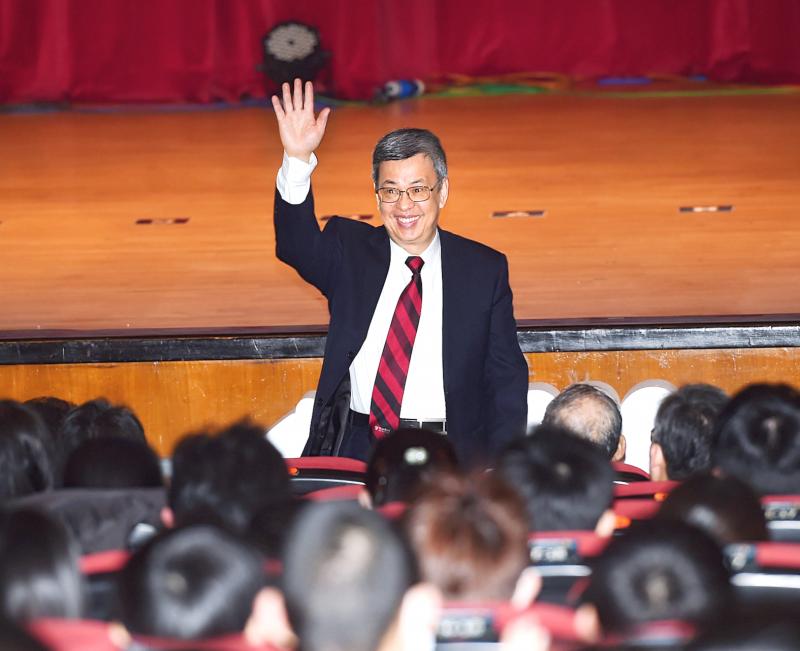Vice President Chen Chien-jen (陳建仁) yesterday said that he would give up his pension and privileges, and return to his position as a research fellow at Academia Sinica.
He will be the first vice president to renounce their pension and privileges.
The Act of Courtesy for Former Presidents and Vice Presidents (卸任總統副總統禮遇條例) stipulates a monthly pension of NT$180,000 (US$6,010) for a former vice president, along with a NT$4 million annual budget to pay for their security detail, chauffeur and operational costs of their office.

Photo: Fang Pin-chao, Taipei Times
However, the budget is reduced by NT$500,000 each year over a four-year period to NT$2.5 million, where it would remain.
Eschewing the pension and payments would save the nation about NT$23 million in the first four years after he leaves office.
However, as his position has made him privy to state secrets, President Tsai Ing-wen (蔡英文) has ordered security to protect Chen under the Special Service Act (特種勤務條例), a source said.
“True power comes from service,” Chen wrote yesterday on Facebook, quoting Pope Francis.
Chen said that it has been his honor to serve Taiwan for four years, during which he took part in advocating for marriage equality, improving human rights and containing the COVID-19 pandemic.
Chen, who led the fight against SARS from 2003 to 2004 as head of the then-Department of Health, said he is glad to see his team reuniting again to fight against COVID-19 and that Taiwanese are practicing better personal hygiene.
Quoting Mother Teresa, Chen, a devout Catholic, compared himself to a “little pencil in God’s hands,” which when broken is sharpened a little more.
It is time for the pencil to continue writing research papers and books, he said.
Asked about his advice for vice president-elect William Lai (賴清德), Chen said during a meeting with journalists at the Presidential Office in Taipei that no policy can win everyone’s support and that any politician would face both praise and criticism.
Lai is more experienced in politics and more capable than he is, Chen said, adding that he is convinced that Lai would help Tsai make Taiwan better in the next four years.
Later yesterday, Tsai on Facebook thanked Chen for his help in promoting pension reform, marriage equality, diplomatic affairs and disease prevention.
Everyone who has worked with Chen likes him for his warmth and optimism, Tsai wrote.
Academia Sinica confirmed that Chen would return to his research post at its Genomics Research Center.
The institution has prepared him an office, it said, adding that it would rely on Chen’s expertise in epidemiology and public health, to boost its related research capacity.

Alain Robert, known as the "French Spider-Man," praised Alex Honnold as exceptionally well-prepared after the US climber completed a free solo ascent of Taipei 101 yesterday. Robert said Honnold's ascent of the 508m-tall skyscraper in just more than one-and-a-half hours without using safety ropes or equipment was a remarkable achievement. "This is my life," he said in an interview conducted in French, adding that he liked the feeling of being "on the edge of danger." The 63-year-old Frenchman climbed Taipei 101 using ropes in December 2004, taking about four hours to reach the top. On a one-to-10 scale of difficulty, Robert said Taipei 101

Nipah virus infection is to be officially listed as a category 5 notifiable infectious disease in Taiwan in March, while clinical treatment guidelines are being formulated, the Centers for Disease Control (CDC) said yesterday. With Nipah infections being reported in other countries and considering its relatively high fatality rate, the centers on Jan. 16 announced that it would be listed as a notifiable infectious disease to bolster the nation’s systematic early warning system and increase public awareness, the CDC said. Bangladesh reported four fatal cases last year in separate districts, with three linked to raw date palm sap consumption, CDC Epidemic Intelligence

Taiwanese and US defense groups are collaborating to introduce deployable, semi-autonomous manufacturing systems for drones and components in a boost to the nation’s supply chain resilience. Taiwan’s G-Tech Optroelectronics Corp subsidiary GTOC and the US’ Aerkomm Inc on Friday announced an agreement with fellow US-based Firestorm Lab to adopt the latter’s xCell, a technology featuring 3D printers fitted in 6.1m container units. The systems enable aerial platforms and parts to be produced in high volumes from dispersed nodes capable of rapid redeployment, to minimize the risk of enemy strikes and to meet field requirements, they said. Firestorm chief technology officer Ian Muceus said

MORE FALL: An investigation into one of Xi’s key cronies, part of a broader ‘anti-corruption’ drive, indicates that he might have a deep distrust in the military, an expert said China’s latest military purge underscores systemic risks in its shift from collective leadership to sole rule under Chinese President Xi Jinping (習近平), and could disrupt its chain of command and military capabilities, a national security official said yesterday. If decisionmaking within the Chinese Communist Party has become “irrational” under one-man rule, the Taiwan Strait and the regional situation must be approached with extreme caution, given unforeseen risks, they added. The anonymous official made the remarks as China’s Central Military Commission Vice Chairman Zhang Youxia (張又俠) and Joint Staff Department Chief of Staff Liu Zhenli (劉振立) were reportedly being investigated for suspected “serious